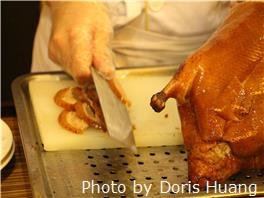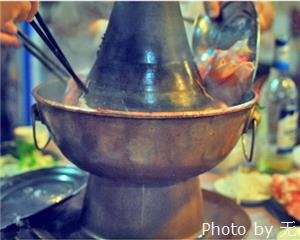With the exception of Beijing’s best-known culinary export, Peking Duck, most of the city’s most famous dishes have been adopted from surrounding areas; Hebei, Shandong, Inner Mongolia, and Xinjiang. Regardless of their origin, all of the following dishes are now fully ingrained in Beijing life and can be sampled at restaurants throughout the city.
Beijing Roast Duck
 Beijing roast duck or Peking Duck (北京烤鸭 běijīng kǎoyā /bay-jing kaow-yaa/) is the epitome of Beijing cuisine and if you had to choose just one dish to try whilst in the capital, this would be it. The dish is mostly esteemed for the thin, crispy skin, with authentic versions of the dish serving mostly skin and little meat. Whilst sauces and accompaniments will vary between restaurants (the most common being scallion and cucumber) it is difficult to go wrong with roast duck in Beijing.
Beijing roast duck or Peking Duck (北京烤鸭 běijīng kǎoyā /bay-jing kaow-yaa/) is the epitome of Beijing cuisine and if you had to choose just one dish to try whilst in the capital, this would be it. The dish is mostly esteemed for the thin, crispy skin, with authentic versions of the dish serving mostly skin and little meat. Whilst sauces and accompaniments will vary between restaurants (the most common being scallion and cucumber) it is difficult to go wrong with roast duck in Beijing. A lot of restaurants offering this dish will carve the duck beside your table. If you eat at one of Beijing’s more famous duck restaurants it will also be accompanied by a short demonstration on the correct way to assemble a Peking Duck wrap using chopsticks. Whilst this may take some time to master, rest assured that the wraps don't need to be well constructed to be delicious.
A local trick, that comes highly recommended, is to dip the crispiest pieces of skin in sugar before eating.
Recommendation: Da Dong Duck Restaurant (大董烤鸭)
Address: F1-F2, Nanxincang Business Building, 22 Dongsitiao Jia, Dongcheng District 东城区东四十条甲22号南新仓商务大厦1-2楼
Price: CNY198 for a whole duck (will feed three/four)
Jiaozi — Chinese Dumplings
There is a lot of myth and mystery surrounding the history of Jiaozi (饺子 jiǎozi /jyaow-dzuh/) and the dish has long been a part of Chinese folk tradition. Whilst they are popular throughout Asia, a plate of Jiaozi with a soy sauce, vinegar and chilli dip is synonymous with Northern Chinese cuisine.
Traditional recipes contain minced pork, ginger and leek, however you can find restaurants that offer all types of different meat and vegetable fillings.
Jiaozi is another dish that can be found anywhere across Beijing and whilst there are a number of better-known dumpling restaurants and chains, some of the tastiest dumplings (and most interesting experiences) can be found in smaller, less conspicuous family eateries where dumplings are the only thing on the menu. At these restaurants you can often sit and watch the next batch of dumplings being rolled and filled as you eat.
Recommendation: Mr Shi's Dumplings (老石饺子)
Address: 74 Baochao Hutong, Gulou Dong Dajie 东城区鼓楼东大街, 宝钞胡同74号
Price: CNY20–30/plate (15 jiaozi)
Jing Jiang Rou Si — Shredded Pork in Beijing Sauce
Jingjiang rousi (京酱肉丝 jīng jiàng ròu sī /jing-jyang roh-srr/) is another dish incredibly popular with local 'Beijingers' and and unlike many of the cities other popular dishes, it originated in the capital. It's popularity may stem from its simplicity; sliced pork cooked in a sweet bean sauce served with soya bean wraps.
Although it doesn't look like the most appealing meal, once you have tried the first wrap you will understand why it is so widely enjoyed. Jingjiang rousi is a necessary component of any authentic Beijing dining experience.
Recommendation: Jin Ding Xuan Restaurant (金鼎轩)
Address: 77 Hepingli Street, Dongcheng District 北京市东城区和平里西街77号
Price: CNY60/person (for an entire meal)
Gangou Potatoes
The literal translation of this dish ‘dry pot potato slices’ (干沟土豆片 gàn gōu tǔdòu piàn /gan goh too-doh pyen/) offers diners a fairly accurate idea of what to expect. Slices of potato, crispy pork and chillies simmer in an iron pot sat atop an open flame. As you are working your way through the meat and potatoes, the bed of sliced onions that is hidden underneath slowly caramelizes in oil, leaving you with a delicious snack to finish your meal on.
It is a dish best enjoyed during the colder months but is popular with locals all year round.
Recommendation: Any of the rows of restaurants along Ghost Street will serve this dish. It is best enjoyed as part of a larger meal so it is recommended that you choose a restaurant along this street that serves other dishes you are interested in.
Address: Ghost Street (Dongzhimen Nei Dajie, Chaoyang District) 簋街 (东直门内大街)
Tudou Si — Shredded Potato
This dish (土豆丝 tǔdòu sī /too-doh srr/) is another for potato lovers. Thinly shredded potatoes are stir-fried with green peppers and seasoning, and can be served hot or cold. Don't be fooled by the plain look of the potatoes as they are coated in a sweet gloss which give the dish its flavor. Walk down a Beijing street at lunch time you will likely see more than one local adding tudou si to their lunch time bowl of meat and rice. It is a great accompaniment to most meat dishes but equally nice alone as a lunch time snack.
Recommendation: Shijin Yuan (十锦园)
Address: Dongsanli Tunzhong 13, Sanlitun, Chaoyang District 三里屯东二街东三里社区13
Price: CNY15
Noodles with Soybean Paste — Zhajiang mian
Zhajiang mian (炸酱面 zhá jiàng miàn /jaa-jyang myen/)is very popular when it comes to traditional Beijing cuisine. It has three main ingredients: wide hand-pulled noodles, vegetable pieces, and pork. Vegetables vary seasonally, but there are never less than seven kinds. It is an ideal lunch time snack for visitors short on time as it is usually ready seconds after you order. As an added bonus it is very inexpensive.
Recommendation: Old Beijing Zhajiang Noodle King (老北京炸酱面大王)
Address: 56 Dong Xinglongjie, Dongcheng District 东城区东兴隆街56号
Price: CNY15
Mongolian Hotpot
 Mongolian hotpot (蒙古火锅 Ménggǔ huǒguō /mnng-goo hwor-gwor/), a dish that’s history dates back over 1,000 years, is as much about the enjoyment of the cooking as it is the taste. At traditional hotpot restaurants diners will sit around a large pot of boiling soup, in which they cook their own food. Whilst Mongolian hotpot usually involves a large amount of lamb, any number of meats, vegetables and breads are available. These are sliced thin to ensure they cook quickly and evenly.
Mongolian hotpot (蒙古火锅 Ménggǔ huǒguō /mnng-goo hwor-gwor/), a dish that’s history dates back over 1,000 years, is as much about the enjoyment of the cooking as it is the taste. At traditional hotpot restaurants diners will sit around a large pot of boiling soup, in which they cook their own food. Whilst Mongolian hotpot usually involves a large amount of lamb, any number of meats, vegetables and breads are available. These are sliced thin to ensure they cook quickly and evenly. This northern-Chinese style of hotpot uses a soup which is less spicy and generally less flavored than its southern counterparts; with more emphasis being placed on the ingredients that are cooked rather than what they are cooked in.
Recommendation: Dong Lai Shun (东来顺)
Address: 12 Xinyuanxili Zhongjie, Chaoyang District 朝阳区新源西里中街12号
Price: CNY 90/person (for an entire meal)
Donkey Burger
Originating in the city of Baoding in northern Hebei province, Beijing has adopted the donkey burger (驴肉火烧 lǘròu huǒshāo /lyoo-roh hwor-shaow/) as its own. Restaurants offering this dish serve a number of different donkey meals, however the one to try is the donkey burger. Shredded donkey meat is served in a piping-hot, crunchy bun with a green pepper relish.
This dish isn’t recommended solely for its novelty value. The contrast between the succulent meat, crunchy bun and sweet relish make it incredibly tasty and you are unlikely to stop at one. Look out for a big 驴肉 (donkey meat) sign clearly visible on the front of all restaurants offering this meat.
Recommendation: Wang Pangzi (王胖子)
Address: 80 Gulou Xidajie, Xicheng District 鼓楼西大街80号
Price: CNY 10–12/burger
Rolling Donkey
Unlike the donkey sandwich, this dish doesn't actually contain meat of any kind, let alone donkey. Rolling Donkey (驴打滚 lǘ dǎgǔn /lyoo daa-gwnn/) refers to a kind of traditional Beijing snack, also known in southern China as Rolling Horse (马打滚 mǎ dǎgǔn), with a soft skin made of glutinous rice flour and a red bean stuffing.
Recommendation: Bai Ji Niangao (白记年糕)
Address: 1/F, Niu Jie Qingzhen Supermarket, 1 Shangye Lou, Niu Jie, Xuanwu District 宣武区牛街(北口西侧)1号商业楼牛街清真超市1楼
Price: CNY 5–20
Tuckahoe Pie
Tuckahoe pie (茯苓夹饼 fúlíng jiābǐng /foo-ling jyaa-bing/) is a traditional paper-thin snack in the shape of a full moon, popular in Beijing. It consists of a basic pancake wrapped in sugar, honey and an assortment of nuts.
According to a legend, tuckahoe pie originated in the South Song Dynasty (1127–1279), and the preparation method and the required equipment are well documented. The herb tuckahoe has many medical effects, and therefore it is popular with Chinese people, especially women and the elderly.
Recommendation: Multiple food stalls and shops can be found along Wangfujing Snack Street (王府井小吃街) selling this snack and many other Beijing snack streets. See Related Reading.

Aucun commentaire:
Enregistrer un commentaire